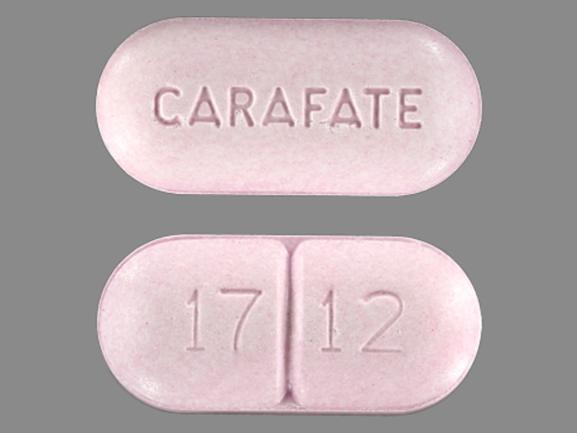Carafate and Alcohol/Food Interactions
There is 1 alcohol/food/lifestyle interaction with Carafate (sucralfate).
Sucralfate Food/Lifestyle
Moderate Food Interaction
ADJUST DOSING INTERVAL: The administration of sucralfate with enteral nutrition may result in precipitation and the formation of bezoars that may obstruct feeding tubes. The proposed mechanism is the formation of an insoluble aluminum-protein complex between the aluminum in the sucralfate and the protein in the enteral feeding. In addition, sucralfate may not become activated due to the alkaline pH of enteral nutrition products.
MANAGEMENT: Some experts recommend separating the sucralfate doses from enteral feedings by at least 1 hour. Alternatively, consideration may be given to proton pump inhibitors or H2 antagonists.
References (1)
- Wohlt PD, Zheng L, Gunderson S, Balzar SA, Johnson BD, Fish JT (2009) "Recommendations for the use of medications with continuous enteral nutrition." Am J Health Syst Pharm, 66, p. 1438-67
Switch to consumer interaction data
Carafate drug interactions
There are 159 drug interactions with Carafate (sucralfate).
Carafate disease interactions
There are 2 disease interactions with Carafate (sucralfate) which include:
More about Carafate (sucralfate)
- Carafate consumer information
- Check interactions
- Compare alternatives
- Pricing & coupons
- Reviews (72)
- Drug images
- Side effects
- Dosage information
- During pregnancy
- Generic availability
- Support group
- Drug class: miscellaneous GI agents
- Breastfeeding
- En español
Related treatment guides
Drug Interaction Classification
| Highly clinically significant. Avoid combinations; the risk of the interaction outweighs the benefit. | |
| Moderately clinically significant. Usually avoid combinations; use it only under special circumstances. | |
| Minimally clinically significant. Minimize risk; assess risk and consider an alternative drug, take steps to circumvent the interaction risk and/or institute a monitoring plan. | |
| No interaction information available. |
See also:
Further information
Always consult your healthcare provider to ensure the information displayed on this page applies to your personal circumstances.


